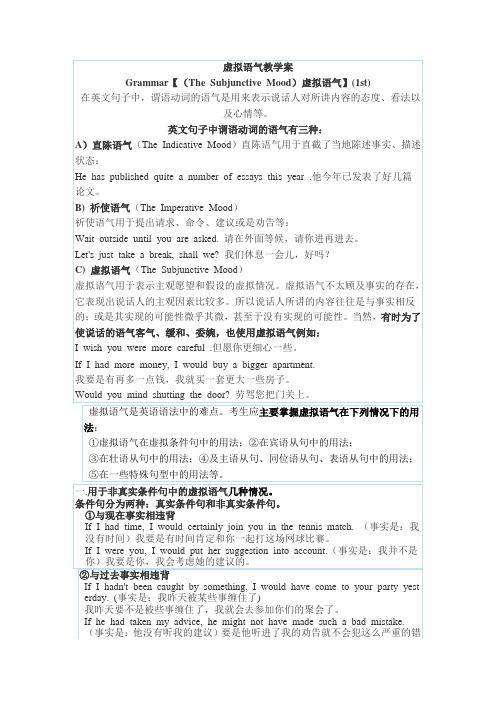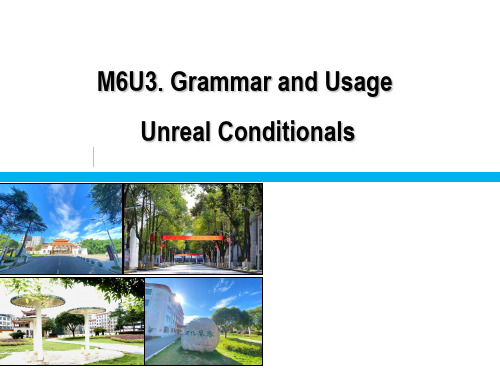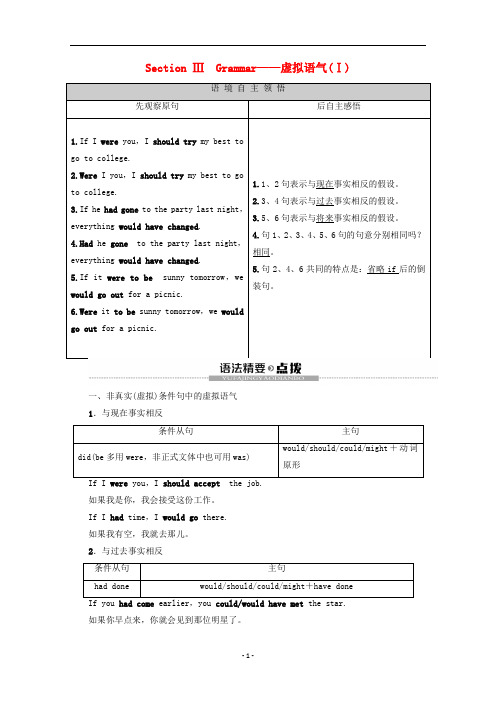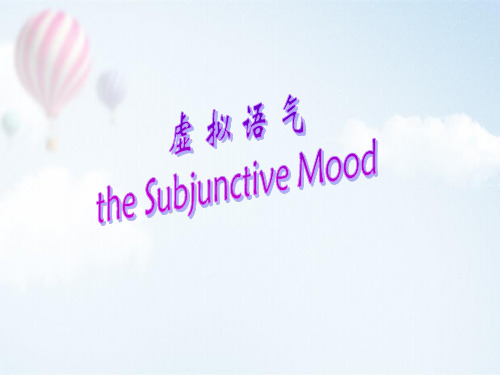牛津高中英语 模块六 unit3 Grammar 虚拟语气
高中英语Module6 Unit3Grammar Period2

高中英语Module6 Unit3Grammar Period2发表时间:2014-06-19T15:03:24.250Z 来源:年4月(总第65期)供稿作者:丁小亚[导读] 虚拟语气是近几年高考英语必考的语法,其重要性可见一斑,然而要让学生真正地理解掌握这一语法现象却非易事。
丁小亚江苏省南京市临江高级中学211102虚拟语气是近几年高考英语必考的语法,其重要性可见一斑,然而要让学生真正地理解掌握这一语法现象却非易事。
在牛津高中英语Module6 Unit3和Unit4的语法部分就是需要学生掌握这一语法,但学生对于真实条件句和非真实条件句常常分不清楚,更别提分清现在的虚拟和对过去的虚拟,真是剪不断理还乱。
看了几个课件,将其归纳得一览无余的,讲座似的,势必枯燥无味;自己想编个故事穿插整堂课,又是心有余而力不足。
几星期前,我们组织全校性的英语节活动,此次活动丰富多彩,有英语猜谜,英语绕口令,英语短剧表演,还有英语才艺秀等等。
活动之后我明显感觉到学生学习英语的积极性变高了,高二(3)是变化最明显的班级之一。
原来他们学习英语很被动,只爱做题目,不想开口说。
尽管有些有说英语的欲望,但在怕别人嘲笑的压抑气氛中往往沉默不语。
高二这一时期的英语教学的工作重点在于改善英语课堂学风,但收效甚微。
然而,英语节之后就不一样了。
早读英语声朗朗,连班主任都觉诧异;上课也不再Boy或Dog了,取而代之的是朗读整个句子;会有同学主动起来回答问题,越来越多的同学enjoy losing face了!我意识到好兆头出现了,我暗下决心,一定要好好呵护。
今天这节英语课是Unit3Grammar第二课时巩固复习课,虽是一天的最后一节课,但当我走进教室,全体同学却异常大声地问好,这无不暗示着学生们的想法:I like speaking English! 这节课一开始,值日报告的同学带来的是模仿电台热线心理咨询的节目。
“串通好”的三位同学分别向她“阐述”不同的心理问题,然后“节目主持人”逐一给予建议。
牛津选修模块6《虚拟语气》

If I were you, I should/would go at once. 要是我有自己的车,我该多福。
If I had a car of my own, I should be very happy.
(2)与过去事实相反的条件 句 If…过去完成时…, 主句+ would/could / might/should have done If you had been there last night, nothing would have happened. If she had got up earlier, she would have caught the bus.
一、配对题 (B )1.If Tony had been to China (C )2.Had you told me about it earlier (A )3.If you knew how to shoot a film A B C D we would invite you to the conference he would have visited BeiJing I wouldn’t have made that mistake He would be considered impolite.
A. Had I been you
C. Were I you
B.I were you
D. I had been you
句型转换
If I had had time, I would have run round that lake again. Had I had __________time, I would have run round that lake again. If there should be a flood, what should we do? Should there be flood, what should we do? _______________a
高中英语Unit3 Understanding each other 4牛津版选修六

Unit3 Understanding each otherGrammar and usage虚拟语气一、概述语气是一种动词形式,表示说话人对某一行为或事情的看法和态度.虚拟语气表示说话人所说的并不是事实,而是一种假设,建议或主观愿望.二、本单元重点讲述了非真实条件句中虚拟语气的三种情况:1. 表示与现在事实相反的假设其基本结构是: 条件句中谓语动词用过去式(be的过去式用were), 主句用would/ should/ could/ might + 动词原形.例如:If everyone in the country knew first aid, many lives would be saved. 如果每个国民都懂得急救(的知识),许多生命就会得以挽救.( 含义是: 不是人人都懂得急救,所以很多生命得不到挽救.)If I were you, I wouldn’t do it like that.如果我是你的话,我就不会这样做.2. 表示与过去事实相反的假设其基本结构是:条件句谓语动词用“had +p.p.”,而主句谓语动词用“would/ should/ could/might +have + p.p.”. 例如:If the hurricane had happened during the day-time, there would have been more deaths.如果飓风发生在白天,死亡人数会更多. (事实是: 飓风发生在午夜到早晨6点)If we had known that she was to arrive yesterday, we could have met her at the station.如果我们知道她昨天到,就可以到车站接她了.(事实是:我们不知道她昨天到,所以我们没能到车站去接她)3. 表示与将来事实相反的情况基本结构有三种: ⑴条件句谓语动词用过去式(be 的过去式一般用were),主句用should/ would/ could/ might + 动词原形, ⑵条件从句的谓语用should +动词原形,主句用should/ would/ could/ might + 动词原形; ⑶条件从句的谓语用were to + 动词原形,主句与上同. 例如:If it rained tomorrow, out plan would be put off.假如明天下雨,我们的计划就得推迟. (最近天气很好.) (条件从句中的谓语动词用过去式,表示说话人认为下雨的可能性不大, 而如果用一般现在时的话,则表示说话人认为下雨的可能性很大)If he should see me, he would tell me.假如他看见我,就会告诉我. ( 用should + 动词原形强调一种有偶然实现的可能性,其现实性比用were to + 动词原形大, 比过去式+ 动词原形小)If he were to come, what should we say to him?假如他来了, 我们对他说什么呢? (用were to +动词原形比较正式,多用于书面语中, 表示实现的可能性很小)拟条件句和混合虚拟条件句.1. 单一虚拟条件句单一虚拟条件句指主句和从句与同一时间的事实相反的虚拟条件句. 例如:If it should rain tomorrow, the race would be put off.(主从句与将来事实相反) 如果明天下雨,比赛将推迟.If you had been more careful, you would have passed.( 主从句与过去事实相反) 如果你再仔细些,你就会通过的.If it were not for the leaning tower, the city of Pisa wouldn’t be so famous.如果没有斜塔的话,比萨城也不会这么有名.( 主从句与现在事实相反)2. 混合虚拟条件句很多情况下,从句和主句并不与同一时间的事实相反.例如:If you had followed my advice, your English would be much better.如果当时你听了我的话,现在你的英语就会好多了.( 从句与过去事实相反,主句与现在事实相反)If he weren’t a kind-hearted man, he wouldn’t have helped such a man as you that day.如果不是他这人很好心的话, 那天他决不会帮助一个像你这样的人的.( 从句是与现在情况相反的假设,主句表示与过去事实相反的假设.)If it had n’t been for you, I would have to make another trip there tomorrow.如果不是你的话, 我明天还要再走一趟.( 从句与过去事实相反,主句与将来事实相反.)注意: 在正式文体中,虚拟条件句的从句部分如果含有were, should 或had, 可将if省略,再把were, should 或had 移到从句句首,实行倒装.例如:Were it to rain tomorrow, we would delay our trip.如果明天下雨,我们将推迟旅行.Had you attended the party, you would have met Jack.如果你参加了聚会,你会见到Jack 的.Should I get a rise, I would treat you to whisky.如果我能涨工资,就请你喝威士忌.TaskWriting a letter to explain cultural misunderstandings●Teaching objectives:1.learn about taboos in different cultures and understand what theycan do or cannot do when they are in contact with people from different backgrounds2.learn to complete a text by listening3.review the ways to ask questions4.write a letter of an apology to explain misunderstandings●Teaching focus and difficulties:1.writing down answers2.writing a letter to explain misunderstandingsTeaching methods:1. Listening, reading and thinking to get students to understand the text.2. Pair discussion and group discussion to get students to participate in the classroom activities.●Teaching aids:The multimedia●Teaching procedures:●Step 1 Skills building 1: completing a textTips on completing a text by listening:1. Make sure you read the text first so you understand the subject of the text and the type of words that you are likely to hear.2. Try to guess the words that might be used to fill in the blanks.3. Look for clues in the sentences and in the words before or after the blanks.4. Decide if it is content words or grammar words that you are listening for.Step 2 ListeningYour school has some visitors from abroad. Your headmaster asked you and your classmate to show the guests around. Something puzzled you during the trip. Listen to the conversation between you and your classmate, and complete your diary entry on page 42.Step 3 ReadingA few days after you and your classmate had taken the visitors around Beijing your classmate found this article in a magazine. Circle the taboos that help explain some of the strange incidents that happened when you showed the visitors around.Suggested answers➢If you are from India, you may not eat beef because of your religion.➢If you are from the West, you probably would not like to eat chickens’ feet.➢In India, it is impolite to shake hands or give someone something with your left hand.➢Remember not to just put the business cards in your pocket without looking in Japan .Step 4 ListeningYou want more information about cultural habits, so you go to one of your teachers, who has traveled to the USA and Japan, for help. Listento your teacher and fill in the blanks in your notes below.Step 5 Skills building 2: asking questionsWhen we want to find out about something, we need to ask questions. We can use questions beginning with the following words:What – when we want to find out about something specific.How – when we want to find out the way something should be done. Which – when we want to specify which one of a choice of possibilities.When - when we want to inquire about time.Why - when we want to find out a reason.Where - when we want to find out about the place in which something happened.Step 6 PracticeYou want to ask your classmate about the following things. Form your questions with the correct question words first, and then find a partner to answer questions. Answers can be found in the magazine article on page 43. Take turns asking questions.Suggested answers1. What food do the people from India not eat?2. Which hand shouldn’t be used to shake hands with or give things to people from India?3. What do Japanese people have to buy when they travel anywhere?4. What should you do when a Japanese person gives you a business card?5. What does the OK sign mean for Japanese people?6. Why do people from the USA do not like crowded places?Step7 Skills building 3: writing a letter of apologyWhen writing a letter of apology, you need to include the following:⏹your address⏹the date⏹an opening⏹the purpose of the letter should be given in the first sentence.⏹an explanation⏹ a closing phrase (to apologize again)⏹your name and signatureStep8 PracticeYou want to write a letter of apology to the foreign visitors to explain misunderstandings. Find a partner and discuss what to include in the letter. Each person should write a different part.。
牛津高中英语M6Unit3Grammar虚拟语气

◎ If I were the student, I would not use the
mobile phone in class.
Conclusion
以上例句谈论的都是与 现在事实相反的情况
If+主语+ did(were) , 主语+ would/should/could/might+动词原形 .
Practice
C 1. I don’t have a cellphone. If I _______ one , it would
be convenient for me to get in touch with others.
A. has
B. have been
C. had
D. have
2. If the earthquake had happened in the daytime,
visit to the Taizhou Bridge.
had not been
4. If it hadn’t rained last Sunday, we cmouigldhgt o picnicking.
could have gone
省略if 的虚拟条件句的倒装
IfWI ewreerIe Obama’s daughter, I would be very happy.
A 5. If I _____ in the 22nd century, I ______
my vacation in a very different way. A. should live; would spend B. will live; should spend C. were living; should have spent D. will be living; would have spent
牛津英语模块六第三单元语法 虚拟语气教学案

③He would have come to see you earlier but he just came back from his business trip .(本句中的上下文是:but he just came back from his business trip,表示:要是他在家没出差的话)他本来早就来看你了,可他却出差刚刚回来。
2)用一个副词或连词but / otherwise / or等表示虚拟条件和真实情况交织在一句中如:
①He telephoned to inform me of your birthday,or (=If he hadn't telephoned to inform me of your birthday)Iwould have knownnothing about it.
A. were not ill; wouldn't beB. had been ill; wouldn't have been
C. had been ill; should have beenD. hadn't been ill; could be
3. If you had enough money, what ________?
假如你过两天去海南,我现在就可以安排我在那儿的朋友去机场接你。
★★当条件状语从句表示的行为和主句表示的行为所发生的时间不一致时,被称为"错综时间条件句"动词的形式要分别根据它所表示的不同时间作相应的调整。
高中英语 译林牛津版模块六第三单元虚拟语气课件

Tips
Modal Verbs (情态动词)can be remembered like this:
妈, 我 受 苦!
Might would should could
+do/have done
Practice 1 练习
IF ALL WERE ONE
If all the seas
(be) one sea,
Farewell to the heroes!
Amazing May they rest in peace! people
Writing and Presentation
Situation 1 : Looking back to 2020, what are your regrets? And what should you have done to do it better? Situation 2 : In the past few months, China-US relations raised great concern around the world. If you were the newly-elected president Biden, how would you like to deal with the problem and maintain the world peace? Situation 3 : Who would you like to choose to be in 2021, and what would you do?
Boy: Will you marry me? Girl: I would marry you if you were the last
boy on the earth.
高中英语Unit3UnderstandingeachotherSectionⅢGrammar——虚拟语气(Ⅰ)教案(含解析)牛津译林版选修6

Section ⅢGrammar——虚拟语气(Ⅰ)语境自主领悟先观察原句后自主感悟1.If I were you,I should try my best togo to college.2.Were I you,I should try my best to goto college.3.If he had gone to the party last night,everything would have changed.4.Had he gone to the party last night,everything would have changed.5.If it were to be sunny tomorrow,wewould go out for a picnic.6.Were it to be sunny tomorrow,we wouldgo out for a picnic.1.1、2句表示与现在事实相反的假设。
2.3、4句表示与过去事实相反的假设。
3.5、6句表示与将来事实相反的假设。
4.句1、2、3、4、5、6句的句意分别相同吗?相同。
5.句2、4、6共同的特点是:省略if后的倒装句。
一、非真实(虚拟)条件句中的虚拟语气1.与现在事实相反条件从句主句did(be多用were,非正式文体中也可用was)would/should/could/might+动词原形如果我是你,我会接受这份工作。
If I had time,I would go there.如果我有空,我就去那儿。
2.与过去事实相反条件从句主句had done would/should/could/might+have done如果你早点来,你就会见到那位明星了。
If he had seen you yesterday,he would have returned you your book.如果他昨天见到你,他就会还给你书的。
牛津高中英语--译林版--M6U3虚拟语气(37张PPT)

与将来事实相反虚拟:
大话西游
如果上天能够给我一个再来一次的机会, 我会对那个女孩子说三个字:我爱你。 如果非要在这份爱上加上一个期限,我希望是--一万年! If the God ________________________(give) me should give/were to give/gave another chance,I_________ (tell) the girl three would tell words, “ I love you.” If I ______(have to) set a to time limit to our love, It_________ had (be)10,000 years! would be
过去
If 从句的谓语形式 主句的谓语形式 would/could/should had done /might +have done
与过去事实相反虚拟:
hadn’t hit ( not hit) an iceberg, If Titanic ________ have sunk the unsinkable ship wouldn’t _______________ (not sink) into the ocean.
如果他早起,他就不会上学迟到。
If he had got up early, he would not have been late for school.(与过去事实反)
If I ________ had learnt (learn ) how to swim,
would not have been (be) trapped in I __________________ this island.(与过去事实相反)
- 1、下载文档前请自行甄别文档内容的完整性,平台不提供额外的编辑、内容补充、找答案等附加服务。
- 2、"仅部分预览"的文档,不可在线预览部分如存在完整性等问题,可反馈申请退款(可完整预览的文档不适用该条件!)。
- 3、如文档侵犯您的权益,请联系客服反馈,我们会尽快为您处理(人工客服工作时间:9:00-18:30)。
如果他明天有空,我们可以问他一些问题。 If he _s_h_o_u__ld_ _h_a_v_e__ time tomorrow, we __c_o_u_l_d_ a__s_k_ him some questions.
要是你能成功,一切都会好起来的。 If you _s_u_c_c_e_e_d_e_d_/_w_e_r_e_t_o_/s_h_o_u__ld__s_u_c_c_e_e_d__, everything _s_h_o_u_l_d_ _b_e_ all right.
你昨天没必要做家务的。 You _n_e_e_d__n_’t__h_a_v_e__d_o_n_e_ the housework yesterday.
◇ ◇ 与将来事实相反的假设 ◇ ◇
如果明天下雨,你就得带一把伞。
If it is to rain tomorrow, you will have to take an umbrella. If it were to rain tomorrow, you would have to take an umbrella.
put on → put on → had put on
“从现” 一般过去时
过去完成时
(真实) (对现在的虚拟) (对过去的虚拟)
如果她去,就会见到我哥哥。 If she comes, she will meet my brother.
如果她去了,她就可以见见我哥哥了。 If she had come, whe would have met my brother.
如果我有机会,我或许想成为一个商业顾问。 If I _h_a_d__th__e_c_h__a_n_c_e_, I _m__ig__h_t_w__a_n_t_t_o__b_e_ a business consultant.
要不是他们帮忙,我们现在应该非常困难。 If it w__e_r_e_ not for their help, we _s_h_o_u_l_d__b_e_ in a very difficult position.
牛津高中英语
模块六 unit3 Grammar 虚拟
语气
◇ ◇ 真实条件句 ◇ ◇
1. 如果你喜欢这本书,我就给你。 If you _l_ik_e_ the book, I w__i_ll_ g__iv_e_ it to you.
2. 如果你明天来,我会给你一个小礼物。 If you_c_o_m__e__h_e_r_e_t_o_m__o_r_r_o_w_, _I _w_i_ll__g_iv_e__ you a present.
If it were to rain tomorrow… = Were it to rain tomorrow…
If the work had been finished… =Had the work been finished…
要是他们十分钟前出发,半小时后就该到了。
If they _h__a_d_s_t_a_r_te_d__ ten minutes ago, they _w__o_u_l_d_ _a_r_r_iv_e__ in half an hour.
◇ ◇ 与过去事实相反的假设 ◇ ◇
You wouldn’t have caught cold
won’t catch→wouldn’t catch→wouldn’t have caught
“主将”
过去将来时
(对过去的虚Βιβλιοθήκη )(真实) (对现在的虚拟)
if you had put on more clothes.
◇ ◇ 与现在事实相反的假设 ◇ ◇
If you come here tomorrow, I will give you
→a present.
If you c_a__m_e_ here tomorrow, I _w_o_u__ld__g_i_v_e you a present.
如果我高一点,我就能够到那本书。 I _c_o_u_ld__re_a_c_h_ the book if I _w_e__re_ a bit taller.
comes → came → had come will meet → would meet → would have met
如果你早点来,就知道他们在谈什么了。 If you _h_a_d__c_o_m__e__ here earlier, you __w_o_u_l_d__h_a_v_e__k_n_o__w_n___ what they were talking about.
如果我没有爱上家乡的话,很难想象我 现在正在做什么。 It is hard to imagine what I w__o_u_l_d_ __b_e__d_o__in_g____ today if I _h_a_d__n_o_t_ __fa__ll_e_n_ in love with my hometown.
